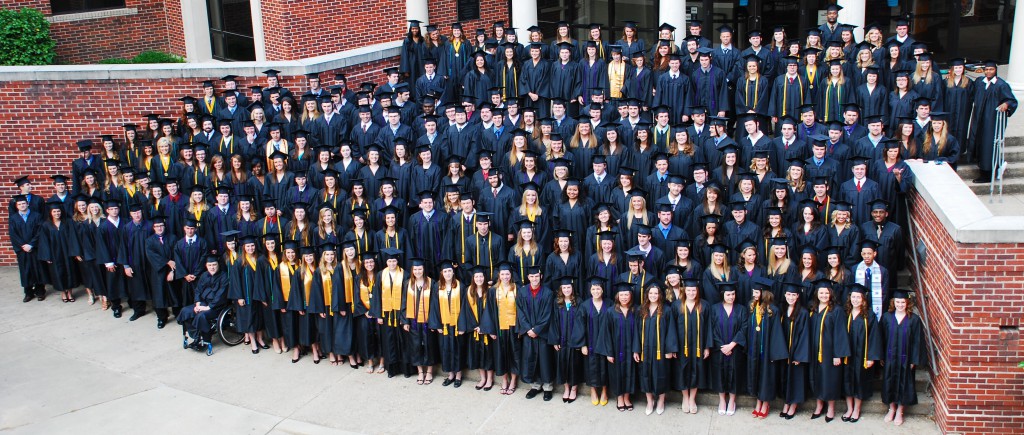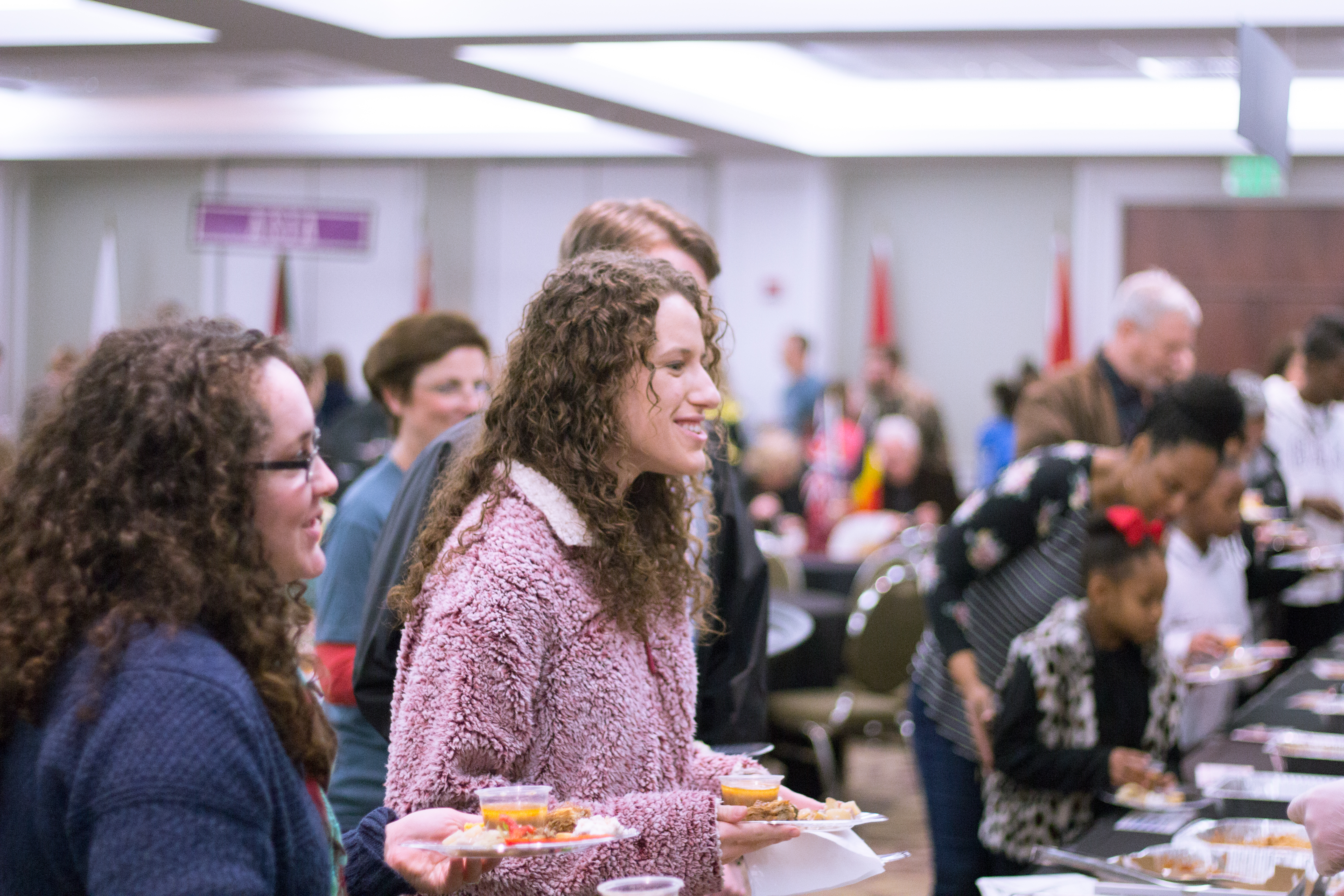 Desegregation: An Honors Seminar
Desegregation: An Honors Seminar
Part 1 of 5
Fifteen honors students contemplated the desegregation of public schools through research on the movement’s early days and trips to key sites in the history of the Civil Rights Movement. The students visited the museum and toured the school at the Little Rock Central High School National Historic Site. Having just read Melba Beals’ Warriors Don’t Cry, the students saw the exterior of the building, where African-American students were initially denied entrance, as well as the cafeteria, hallways and auditorium where the Little Rock Nine persevered through the integration of Central High in 1957.
The honors students researched desegregation in their home towns or in nearby areas and produced portfolios detailing their findings. They also viewed the documentary Hoxie: The First Stand and read Black Like Me, by John Howard Griffin. The one-hour seminar concluded with a trip to the National Civil Rights Museum in Memphis.
In an earlier essay assignment, students were asked to reflect on their visit to Little Rock and on the book by Beals, one of African-American students who integrated Central High amid turmoil and national news coverage in 1957. Five of those reflection papers are listed here. The authors are: Sarah Greeson, a senior from Hot Springs; Jesse Pruett, a senior from Harrison; Kiley Gamble, a junior from McKinney, Texas; Michelle Wasmund, a freshman from Dennison, Texas; and Anna Wakeling, a freshman from Bryant.
Others students in the seminar were: T.J. Bailey, a sophomore from Ft. Smith; Kimberly Carlton, a senior from Brandon, Miss.; Kasa Cooper, a senior from Paragould; Ethan Day, a sophomore from Garland, Texas; Anthony Emerson, a sophomore from Fresno, Texas; Jacob Lively, a senior from Queen City, Texas; Nate Peace, a junior from Bedford, Texas; Jessica Reid, a sophomore from Grandview, Texas; Nolan West, a senior from Bolivar, Missouri; and Clark Whitney, a freshman from Searcy. The course was taught by Dr. Kevin Motl, assistant professor of history, and Dr. Jeff Root, professor of communications and dean of the school of humanities.
The Parallel Universe
by Anna Wakeling
When the February 3 edition of The Signal came out, I eagerly snatched a copy from the free stack outside the Bugtruck. I’d been told it contained an article about the everyday experience of Ouachita’s black community; and having been interested in American race relations for several years, I couldn’t wait to see what it said. I remembered Martin Luther King, Jr.’s comment about 11:00 on Sunday morning being the most segregated hour in America. Since this is a Baptist university, I wondered if that statement would be true here all week long.
Beulah Osueke’s viewpoint was more convicting than I expected, even though I had flattered myself that I knew what to expect. I’d attended an intentionally multiethnic church that held purposeful discussions on race. Still, my church somewhat unintentionally “catered” to the white members, in the words of my black youth pastor. Beulah’s article was pretty unfiltered real-life stuff. I read it as honestly as I could, but somehow it couldn’t penetrate all the way into me. I decided to attend the ROMS panel discussion on OBU race relations the same night our Desegregation class watched Hoxie: The First Stand at the Roots’ house, hoping to gain further perspective even if I were the only white person in the discussion room. I wasn’t; my RA came, as well as one of her RA friends, one of my classmates, and a few girls I didn’t know. I sat on the white side of the room in spite of my recently awakened conscience, knowing that I did it just because I felt more comfortable over there. I learned a little during that hour. I heard some more personal testimony about how much my fellow students of the chocolate persuasion feel out of the loop. What affected me most was hearing A’Laeshia Adams’ account of her change from an extroverted member of her community to a quiet, withdrawn freshman in her OBU classes. I had experienced just the opposite when I came. Then again, I’m white. I wished I could have stayed and maybe come up with a question of my own for the panel, but I had to skedaddle if I wanted to be on time for the movie.
Hoxie was informative, and my liking for documentaries made it a pleasurable way to spend my evening. I thought the schoolchildren really stole the show from the members of the school board by virtue of their innocence. They didn’t let Citizens Council frenzy or a segregationist mindset keep them from welcoming and playing with the new arrivals to their facility. Whatever prejudices they might have been picking up from their elders were still germinating, not yet strong enough to strangle any friendly affection on the basis of melanin.
That being said, the Hoxie school board was just awesome. They stood shoulder to shoulder like the Spartans in the Pass of Thermopylae, knowing they might never get reelected because of the stand they were taking and receiving threats against their safety. Those five men believed without apology that integration was the right choice, and they stood resolutely for it. (And their determination was the only thing that I have seen Dr. Root almost get teary-eyed over.)
Opposing them was the Hoxie Citizens Council, which seemed to be no more of a mature reaction than a spoiled child’s tantrum. It was a source of unnecessary agitation started by a few radicals whose unstated, obvious purpose was to gather in ordinary people—people who might not otherwise have had a problem with integration. But certain politicians liked the status quo, and they also knew that once the African community was educated and admitted to the upper strata of society, they might be dislodged from their carefully maintained seats of white supremacist power. So, they stroked the ego of a local farmer named Herbert Brewer and got him to be their local representative. I agree with the astute observation made by my classmates: Mr. Brewer went along with them mainly because that might be the only time in his life that he would be recognized by people of national significance and have them telling him he was important.
Even after all that, I was still rather removed from the issue. I now understood more of the political side
of integration, but I had still seen it all from a white perspective. Then I read Warriors Don’t Cry.
I admit, I read it the night before the class discussion. Still, it’s a tribute to the book—and to Melba Beals’ authorship—that I finished the whole thing that night and didn’t even stop to go to bed. I was seeing the personal life of a black student who had undergone a situation much worse than Ouachita’s oblivion: Central High’s abuse. I could feel my feet recoiling when she talked about the troublemakers walking on the backs of her heels until she had to wear Band-Aids on her ankles. My eyes watered when she got maced in the face and still felt tender as she ventured out into the sun with her eye patch. But it was the foreword that landed the first sucker punch inside me: “If one person is denied equality, we are all denied equality.” How much more truth could one sentence contain? Equality only within social classes is no equality at all. It was ironic that Melba almost died as a baby in yet another example of unequal treatment: the nurse refusing to administer the Epsom salts needed to keep her alive. It was a brutally simple example of just how hard integration would be, and just how much the Southern establishment would oppose it.
The opposition would have surely been too much for anyone without a family as supportive as Melba’s. Grandma India, in particular, closely rivals the Little Rock Nine as the hero of Warriors. If nothing else, she should be crowned simply for teaching Melba to stand up for her rights without taking revenge on those who had withheld them. That is truer strength than brute force. She never let Melba stew in her self-pity; if she had, Melba might not have made it through the year.
As in Hoxie, integration would have been easier were it not for the busybody activists from Georgia, Louisiana, and Mississippi, all three of them white strongholds. Melba recognized this. It wasn’t their town or their problem. They just thought they knew what was best because they had been taught that everything was better—the way God wanted it, even—when whites held society’s reins. In addition, Dr. Motl pointed out that a victory in integration for blacks anywhere was perceived as a net loss for whites everywhere.
Hoxie at least had a valiant administration, but Central had an apathetic one. Even the teachers exerted paltry efforts to stop the bullying. Besides Mrs. Pickwick, the teachers at Central were wimps. The avid segregationists ruled the day. Dr. Motl was likely right: if they had banded together as the board in Hoxie did and exhibited the attitude, “These are our orders, and we are going to follow them,” there would have been less trouble and less open aggression. What high-schooler in his right mind, no matter how racist he might be, would risk lowered grades or too many principal visits just for the pleasure of harassing already-frightened black kids?
The leadership provided by Orval Faubus was also weak at best. We learned in class that he was not always such a strong advocate for segregation; he just adopted that position to get votes. Later, when riots took over the school grounds and the 101st Airborne Division was sent in, where was our intrepid leader? At a retreat in Georgia.
I don’t know how Melba felt when the federal agents showed up at her door to personally promise President Eisenhower’s protection if she would return to Central, but I know it would have boosted my spirits. Reading about it reminded me that you don’t get noticed by important people unless you do hard things.
Out of the Nine, Ernest Green was the only senior. His senior year was markedly more significant than most people’s. He had to have known that. But the parties and honors and general romping that comes with high school graduation were all denied him. Because those events were all canceled for fear of rioting, Link missed out on them too, and he got more than reasonably ticked off. Would that have been my attitude? As a white girl who’s been subliminally taught all my life that I deserve to have the best time I can afford during my girl-to-woman transition years, I probably would have taken the Link approach; but I wonder what Ernest felt. Did he even mind, since he’d never looked forward to white graduation festivities when he was young? Did he know what he was missing but feel a martyrlike resignation to it, since he’d been denied other white privileges all his life?
It takes much greatness of spirit to keep your self-esteem from being broken down by the kind of abuse that he and Melba suffered, and even to feel sorry for the students whose year was rendered nightmarish by the presence of soldiers in the halls. I think what helped Melba to cope and to hold forth such a magnanimous outlook may have been the same thing that I speculated about Ernest: being used to subhuman treatment, the repeated breaches of justice didn’t enrage or demoralize her as they would have a white girl. Then there was good old Grandma India, who valued turning the other cheek above whining for perfect treatment.
Melba’s secret friend Link is a gold mine for psychological and ethical theorists. In class we debated whether he was a hero or a coward. He appeared heroic when he first met Melba, loaning her his car just in time for her to escape a gang of thugs. But, if he were a true hero, shouldn’t he have defended her? But, his undercover support enabled him to obtain hints about what attacks were planned for Melba so he could warn her ahead of time. But, he wasn’t willing to risk his social standing and family approval for Melba, even though his influence for peace could have carried a lot of weight with his peers, so was he really a true friend? I guess the question about him is this: is it wrong to try to have the best of both worlds? He never asked for Central to be integrated during his senior year, and he was already missing the senior picnic and everything else he’d been looking forward to … so should he be blamed for taking what he could get—namely, a preserved reputation? I suppose it helps that he at least felt conflicted. He knew he was betraying Melba by acting loyal to the segregationists, and betraying his family’s beliefs about him by secretly helping her. Link’s dad also factors in. He wasn’t a virulent segregationist, but if he wanted to keep his business connections open, he had to donate to the Citizens Councils. Forcing Link to attend the segregationist student meetings was likely another face-saving scheme. With that kind of pressure, how noble should we expect a teenage boy like Link to be?
The book’s end moved me especially. Melba had not quite overcome her year of trauma and was momentarily afraid to enter the school, even though it had been forty years since her trials there and she had become a respected journalist in the interim. Then she was welcomed inside by a black student body president. What a way to come full circle. One would wonder if she felt validated, triumphant, or insulted to see herself held in such high regard at her old torture chamber. I think she was so struck by the irony of it that she felt a little of all three, but the pain was enough to keep the return from feeling totally like a victory parade.
My own trip to Central was obviously not so significant, but having read Warriors made it meaningful. I remember admiring the beauty of the facade and wishing I had had such a beautiful building to call my high school. No wonder the Nine wanted to attend. It was nearly impossible to imagine the deserted front stairs full of soldiers and howling people all hellbent on keeping me out when I ascended them so easily. To be lost in a crowd that hates you, as Elizabeth Eckford was the first day she tried to get in, and to not know if there’s anyone around who will help you has to be paralyzing. Her dress had to be wrung out from all the spit on it when she got home that day. That was what I remember hearing as we all gazed at the miniature replica of the dress in the front display case. I can only keep asking, how could I have gone back if I had been her? I’ve been taught all my life that I have rights—rights to look good, to be respected, to take the best of whatever I can find if it’s fair game. Because of that, I don’t think I’ll ever really understand. The universe they lived in is parallel to mine. Even were I to dye my skin like John Howard Griffin did, such a world would still be essentially unattainable.
As classes changed, our group had to move out of the hall into the school office to give the swirling mob of students more room. A rereading of Warriors smacked me head-on when I realized that that was nearly what the Nine had to do, except they were ducking into the office for physical protection. We were standing in the
same place in the office that they had been, looking at a row of unfamiliar white faces behind a long wooden counter. (Irony?) Then a girl came in. She must have been Indian or Hispanic or Middle Eastern—definitely not white. I watched our very white Texan Dr. Motl move aside so she could reach a teacher’s cubbyhole in the wall behind him. I don’t think our experience of role reversal could have been any more complete.
Seeing the clear majority of black students now, thronging the halls as if they know the school is theirs as much as anyone’s, I wonder how much they think about the Nine’s sacrifice. From my glimpses of humanity, I would surmise that they think about it roughly as much as I think about how the Founding Fathers risked themselves to make America an independent nation: when I’m reminded. The least we can all do is show our gratitude by remembering more often.








